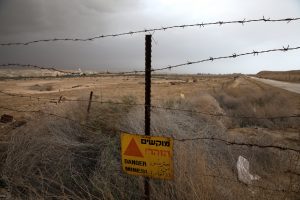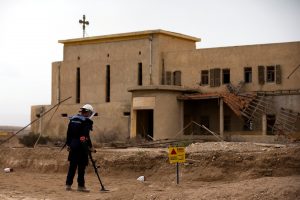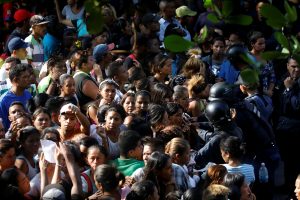
By Eli Berlzon
QASR AL-YAHUD, West Bank (Reuters) – On the western bank of the River Jordan, not far from the spot where Christians believe Jesus was baptized, experts have begun clearing thousands of mines from the ruins of eight churches and surrounding land deserted more than 50 years ago.
Once the anti-tank mines and other explosives are removed, the compounds containing a Roman Catholic church and seven Eastern Orthodox churches abandoned after the 1967 Middle East war can be re-opened, said HALO Trust, a Scottish-based charity organizing the endeavor together with Israel.
The mined area, in the Israeli-occupied West Bank, is about a kilometer (half-mile) from Qasr al-Yahud, the baptism site which HALO said was visited by around 570,000 Christian pilgrims last year.
A team of Israeli, Palestinian and Georgian experts, using hand-held mine detectors and armored mechanical diggers, began clearing the church compounds and the surrounding desert shrubland shortly before the Christian Holy Week that precedes Easter.

A sign warning from land mines is seen on a fence near Qasr Al-Yahud, a traditional baptism site along the Jordan River, near Jericho in the occupied West Bank, March 29, 2018. REUTERS/Ronen Zvulun
Rusting barbed wire fences, with signs warning “Danger Mines!” in Hebrew, English and Arabic, run along a dusty road leading to the 100-hectare (27 acre) area. HALO says the land contains around 2,600 mines and an unknown number of other unexploded ordnance.
Some of the churches may be boobytrapped, the charity says.
In a safe zone at the riverside on Thursday, a family from Spain wearing white baptismal robes stepped into the water.
HALO has been raising funds for the project over several years and said in a statement it intends to complete work at the site by Christmas.
Israel’s Defence Ministry and its Israel National Mine Action Authority have contributed at least half the funding for the project, a ministry spokeswoman said.
HALO described the project as a rare example of multi-faith collaboration in the Middle East, involving Israel and the Palestinian Authority that administers limited self-rule in the West Bank, which welcomed the efforts.
The river area was once a war zone between Israel and Jordan. The two neighbors made peace in 1994 but it took many years before some mine clearing began.
Both claim that the site where John the Baptist and Jesus met is on their side of the biblical river. The Gospel of John refers to “Bethany beyond the Jordan” without further details.
In 2002, Jordan opened its site, showing remains of ancient churches and writings of pilgrims down the centuries to bolster its claim. UNESCO declared it a World Heritage Site in 2015.

A sapper belonging to the HALO Trust, an international landmine clearance charity, looks for old mines in an abandoned church property complex near Qasr Al-Yahud, a traditional baptism site along the Jordan River, near Jericho in the occupied West Bank, March 29, 2018. REUTERS/Ronen Zvulun
Israel opened the baptism area on the western bank of the river in 2011. It has a modern visitor center and stairs for pilgrims to descend into the muddy water.
HALO, which has cleared landmines all over the world and was once sponsored by the late Princess Diana, said on Thursday that three of their staff members were killed and two injured by the accidental detonation of an anti-tank mine in Nagorno Karabakh.
The group were in a vehicle conducting a minefield survey when the explosion occurred in the separatist region in Azerbaijan.
(Writing by Jeffrey Heller; Editing by Raissa Kasolowsky)









